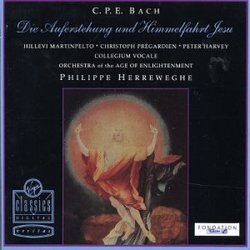| All Artists: Carl Philipp Emanuel Bach, Philippe Herreweghe, Orchestra of the Age of Enlightenment, Hillevi Martinpelto, Christoph Prégardien Title: C.P.E. Bach: The Resurrection and Ascension of Jesus (Auferstehung und Himmelfahrt Jesu) Members Wishing: 0 Total Copies: 0 Label: EMI Import Release Date: 12/23/2002 Album Type: Import Genre: Classical Styles: Opera & Classical Vocal, Chamber Music, Historical Periods, Baroque (c.1600-1750), Classical (c.1770-1830) Number of Discs: 1 SwapaCD Credits: 1 UPC: 077775906929 |
Search - Carl Philipp Emanuel Bach, Philippe Herreweghe, Orchestra of the Age of Enlightenment :: C.P.E. Bach: The Resurrection and Ascension of Jesus (Auferstehung und Himmelfahrt Jesu)
CD Details |
CD ReviewsPoetic cantata with some wonderful instrumental passages Leslie Richford | Selsingen, Lower Saxony | 08/17/2004 (4 out of 5 stars) "In 1787, scarcely a year before his death, Johann Sebastian Bach's second son Carl Philipp Emanuel published this dramatic cantata that he had been working on intermittently for over ten years. The text is by Karl Wilhelm Ramler, a Protestant rationalist, and tells the story of the passion and resurrection of Jesus Christ, but not in the words of the Bible: rather, Ramler puts together a series of poetic descriptions in which various unnamed speakers and the poet himself are represented by a mere three singers (bass-baritone, tenor and soprano). In order to understand this text, one needs very good knowledge of the Bible and of Christian theology (Emanuel Bach was music director of the five main Lutheran churches in Hamburg). The music consists mainly of arias and recitatives with an occasional duet and a couple of instrumental pieces, the style is somewhere between the baroque and the classical. Although Emanuel Bach demonstrates his love of the original and of sensibility, the music is much easier to listen to than, for example, his symphonies. Apart from the singing, there are some wonderful instrumental passages with horn, bassoon or trumpet.
Philippe Herreweghe normally works with one of his own orchestras, but here he can be heard with the Orchestra of the Age of Enlightenment in a recording made in Paris in 1991. Conductor and orchestra seem to have inspired each other, and there are many delights to be heard from the musicians. The choir, the Collegium Vocale from Gent in Belgium, could perhaps have been recorded a shade more clearly and spaciously, but at any rate they provide some excellent interludes without intruding too much of a Flemish or French accent on the German text (I had the vague feeling that the female voices had slightly more difficulty with this than the male.) The three soloists are Peter Harvey, Christoph Prégardien and Hillevi Martinpelto. Harvey and Prégardien both have light, airy singing voices that are very similar. And both produce a magnificent performance: Just listen to "Judäa zittert!" (Track 3 - Peter Harvey) or "Ich folge dir, verklärter Held" (Track 11 - Christoph Prégardien), or, in fact, to any track on which one of the two can be heard. Apart from their lovely timbre and their excellent vocal technique, both deserve praise for their superb enunciation which makes the printed text almost superfluous if one understands German. A rather weaker link in the chain is Hillevi Martinpelto. She, too, has a lovely voice, but her enunciation is far too nasal and gives any listener the hardest of work in understanding what she is singing. It is her performance that robs this CD of the fifth star that it would otherwise have resoundingly deserved." |


 Track Listings (22) - Disc #1
Track Listings (22) - Disc #1